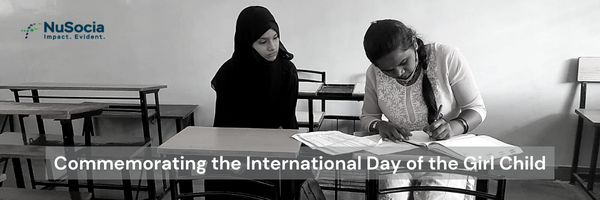The time for change is now!
10 years ago, the United Nations institutionalised the 11th of October as International Day of the Girl Child. In the last ten years, governments, nonprofits, policymakers and the general public have been looking for innovative ways for enabling girls to have their voices heard on a global scale. Yet, the challenges faced by the girl child are myriad.
Nearly 1.6 million girls in India still remain out of school, and over 57% drop out upon reaching Grade 11 (Right To Education Forum, 2021). In India, 3.2% more girls remain out of school, as compared to 2.7% of boys. To add to this phenomenon, COVID-19 and humanitarian crises have only multiplied these complex social issues. It is estimated that over 10 million girls in India are at risk of dropping out of school and pushed into early marriage, trafficking and early poverty because of COVID-19. The opportunity for equal education, sound physical and mental wellness, and a life without violence is still a far dream. If anything, the pandemic may have set several years of progress back.
When faced with adversity, the world’s 600 million adolescent girls have shown us time and again that with the right skills, resources and opportunities, they can be changemakers driving progress in their communities. At NuSocia, we are confident that we are looking forward to a decade of progress, and we stand accountable with and for girls and will continue to invest our efforts, in a future that believes in their potential.
On this special occasion, we would like to showcase a very special project ‘2morrow 2gether’ implemented by the Lila Poonawalla Foundation, which we got to see closely. NuSocia was brought in to do an Impact Assessment of this program, and critically review the program which has positively impacted the lives of 2314 girls across 15 schools, over 10 years, and over 3 life phases.
The program’s aimed to increase the quality of education for girls coming from underprivileged families through scholarships from Grade 7 right up to their graduation. The unique program covered financial support for school fees and educational support, career guidance and counselling. Apart from the academics, the program supported exposure activities at the school level, personality development courses and training to support academics. The objective of each phase was different – At Grade 10 and 12, it was to complete school with good grades and develop clarity on their future career trajectory. At the end of their graduation or chosen diploma course, it was to not only finish the course, but also to be employed in a job of their choice or go on to do their post-graduation in a university of their choice.
The program has been a phenomenal success with 100% of the girls enrolled in Phase 1 of the program, Lila Juniors, are completing 10th Grade and 85% of the early beneficiaries from 2011-12 have reached graduation and those completing graduation have started securing jobs too.
The impact of the program is such that all of the chosen beneficiaries attest their educational, personality and holistic growth to the program ‘2morrow 2gether. 95% of the girls who were part of the program are also committed to remain associated with the program and to give back to the newer batches in form of coaching, mentoring and taking classes.
What is the relevance and importance of programs like ‘2morrow 2gether’ alongside the Right to Education Act?
While doing the Impact Assessment study of the Lila Poonawalla Foundation program, our research team dug deeper into the subject and studied over 50 scholarship programs dedicated to promoting the education of girls from underserved communities. One startling observation was that over 90% of scholarship programs focus on higher education of girls, considering The Right To Education (RTE) Act covers the cost of education upto 14 years, making the Lila Juniors program unique by addressing the invisible needs that exist alongside a favourable policy environment that promotes the education of girls. The biggest achievement of the program has been to pull girls, who were on the cusp of dropping out of school back into the education system, help them complete their education and gain skills needed for the 21st century.
The multilayered Impact Assessment study covered a comprehensive qualitative and quantitative study, towards identifying opportunities to make the existing program more impactful and measurable. We are proud to have collaborated with the Lila Poonawalla Foundation. The work they have done for the education of girls is path-breaking. 2314 girls from disadvantaged families will now go on to inspire a generation of changemakers and leaders in their communities. When we have empowered young people, change is on!
This International Day of the Girl Child, let us all pledge to put our best foot forward to be a catalyst of change for the girls from underprivileged communities. With adversity comes resilience and tenacity. We stand with and for the girls of India.
If your organisation is already engaged in working with girl children and wishes to understand the impact of the program or if you are looking to create an impactful CSR program around girl children and need any support towards that, you can reach out to NuSocia Experts in the domain. Reach out to us as [email protected] and the NuSocia experts would be happy to engage in a conversation that you will definitely find worth your time. The time for change is NOW.




